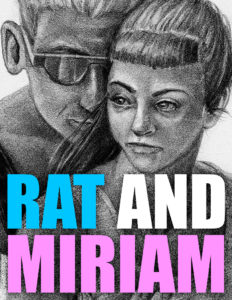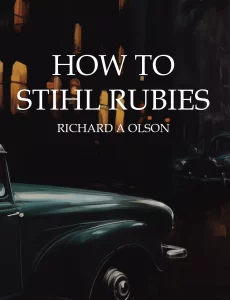
The Lodger: Chapter 10
Amidst an innocent attempt at tidying, Mrs. Bunting finds herself drawn into a clandestine exploration of her lodger's belongings.
By what she regarded as a fortunate chance, Mrs. Bunting found herself for close on an hour quite alone in the house during her husband’s and Daisy’s jaunt with young Chandler.
Mr. Sleuth did not often go out in the daytime, but on this particular afternoon, after he had finished his tea, when dusk was falling, he suddenly observed that he wanted a new suit of clothes, and his landlady eagerly acquiesced in his going out to purchase it.
As soon as he had left the house, she went quickly up to the drawing-room floor. Now had come her opportunity of giving the two rooms a good dusting; but Mrs. Bunting knew well, deep in her heart, that it was not so much the dusting of Mr. Sleuth’s sitting-room she wanted to do—as to engage in a vague search for—she hardly knew for what.
During the years she had been in service Mrs. Bunting had always had a deep, wordless contempt for those of her fellow-servants who read their employers’ private letters, and who furtively peeped into desks and cupboards in the hope, more vague than positive, of discovering family skeletons.
But now, with regard to Mr. Sleuth, she was ready, aye, eager, to do herself what she had once so scorned others for doing.
Beginning with the bedroom, she started on a methodical search. He was a very tidy gentleman was the lodger, and his few things, under-garments, and so on, were in apple-pie order. She had early undertaken, much to his satisfaction, to do the very little bit of washing he required done, with her own and Bunting’s. Luckily he wore soft shirts.
At one time Mrs. Bunting had always had a woman in to help her with this tiresome weekly job, but lately she had grown quite clever at it herself. The only things she had to send out were Bunting’s shirts. Everything else she managed to do herself.
From the chest of drawers she now turned her attention to the dressing-table.
Mr. Sleuth did not take his money with him when he went out, he generally left it in one of the drawers below the old-fashioned looking-glass. And now, in a perfunctory way, his landlady pulled out the little drawer, but she did not touch what was lying there; she only glanced at the heap of sovereigns and a few bits of silver. The lodger had taken just enough money with him to buy the clothes he required. He had consulted her as to how much they would cost, making no secret of why he was going out, and the fact had vaguely comforted Mrs. Bunting.
Now she lifted the toilet-cover, and even rolled up the carpet a little way, but no, there was nothing there, not so much as a scrap of paper. And at last, when more or less giving up the search, as she came and went between the two rooms, leaving the connecting door wide open, her mind became full of uneasy speculation and wonder as to the lodger’s past life.
Odd Mr. Sleuth must surely always have been, but odd in a sensible sort of way, having on the whole the same moral ideals of conduct as have other people of his class. He was queer about the drink—one might say almost crazy on the subject—but there, as to that, he wasn’t the only one! She, Ellen Bunting, had once lived with a lady who was just like that, who was quite crazed, that is, on the question of drink and drunkards—She looked round the neat drawing-room with vague dissatisfaction. There was only one place where anything could be kept concealed—that place was the substantial if small mahogany chiffonnier. And then an idea suddenly came to Mrs. Bunting, one she had never thought of before.
After listening intently for a moment, lest something should suddenly bring Mr. Sleuth home earlier than she expected, she went to the corner where the chiffonnier stood, and, exerting the whole of her not very great physical strength, she tipped forward the heavy piece of furniture.
As she did so, she heard a queer rumbling sound,—something rolling about on the second shelf, something which had not been there before Mr. Sleuth’s arrival. Slowly, laboriously, she tipped the chiffonnier backwards and forwards—once, twice, thrice—satisfied, yet strangely troubled in her mind, for she now felt sure that the bag of which the disappearance had so surprised her was there, safely locked away by its owner.
Suddenly a very uncomfortable thought came to Mrs. Bunting’s mind. She hoped Mr. Sleuth would not notice that his bag had shifted inside the cupboard. A moment later, with sharp dismay, Mr. Sleuth’s landlady realised that the fact that she had moved the chiffonnier must become known to her lodger, for a thin trickle of some dark-coloured liquid was oozing out though the bottom of the little cupboard door.
She stooped down and touched the stuff. It showed red, bright red, on her finger.
Mrs. Bunting grew chalky white, then recovered herself quickly. In fact the colour rushed into her face, and she grew hot all over.
It was only a bottle of red ink she had upset—that was all! How could she have thought it was anything else?
It was the more silly of her—so she told herself in scornful condemnation—because she knew that the lodger used red ink. Certain pages of Cruden’s Concordance were covered with notes written in Mr. Sleuth’s peculiar upright handwriting. In fact in some places you couldn’t see the margin, so closely covered was it with remarks and notes of interrogation.
Mr. Sleuth had foolishly placed his bottle of red ink in the chiffonnier—that was what her poor, foolish gentleman had done; and it was owing to her inquisitiveness, her restless wish to know things she would be none the better, none the happier, for knowing, that this accident had taken place.
She mopped up with her duster the few drops of ink which had fallen on the green carpet and then, still feeling, as she angrily told herself, foolishly upset she went once more into the back room.
It was curious that Mr. Sleuth possessed no notepaper. She would have expected him to have made that one of his first purchases—the more so that paper is so very cheap, especially that rather dirty-looking grey Silurian paper. Mrs. Bunting had once lived with a lady who always used two kinds of notepaper, white for her friends and equals, grey for those whom she called “common people.” She, Ellen Green, as she then was, had always resented the fact. Strange she should remember it now, stranger in a way because that employer of her’s had not been a real lady, and Mr. Sleuth, whatever his peculiarities, was, in every sense of the word, a real gentleman. Somehow Mrs. Bunting felt sure that if he had bought any notepaper it would have been white—white and probably cream-laid—not grey and cheap.
Again she opened the drawer of the old-fashioned wardrobe and lifted up the few pieces of underclothing Mr. Sleuth now possessed.
But there was nothing there—nothing, that is, hidden away. When one came to think of it there seemed something strange in the notion of leaving all one’s money where anyone could take it, and in locking up such a valueless thing as a cheap sham leather bag, to say nothing of a bottle of ink.
Mrs. Bunting once more opened out each of the tiny drawers below the looking-glass, each delicately fashioned of fine old mahogany. Mr. Sleuth kept his money in the centre drawer.
The glass had only cost seven-and-sixpence, and, after the auction a dealer had come and offered her first fifteen shillings, and then a guinea for it. Not long ago, in Baker Street, she had seen a looking-glass which was the very spit of this one, labeled “Chippendale, Antique. £21 5s 0d.”
There lay Mr. Sleuth’s money—the sovereigns, as the landlady well knew, would each and all gradually pass into her’s and Bunting’s possession, honestly earned by them no doubt but unattainable—in act unearnable—excepting in connection with the present owner of those dully shining gold sovereigns.
At last she went downstairs to await Mr. Sleuth’s return.
When she heard the key turn in the door, she came out into the passage.
“I’m sorry to say I’ve had an accident, sir,” she said a little breathlessly. “Taking advantage of your being out I went up to dust the drawing-room, and while I was trying to get behind the chiffonnier it tilted. I’m afraid, sir, that a bottle of ink that was inside may have got broken, for just a few drops oozed out, sir. But I hope there’s no harm done. I wiped it up as well as I could, seeing that the doors of the chiffonnier are locked.”
Mr. Sleuth stared at her with a wild, almost a terrified glance. But Mrs. Bunting stood her ground. She felt far less afraid now than she had felt before he came in. Then she had been so frightened that she had nearly gone out of the house, on to the pavement, for company.
“Of course I had no idea, sir, that you kept any ink in there.”
She spoke as if she were on the defensive, and the lodger’s brow cleared.
“I was aware you used ink, sir,” Mrs. Bunting went on, “for I have seen you marking that book of yours—I mean the book you read together with the Bible. Would you like me to go out and get you another bottle, sir?”
“No,” said Mr. Sleuth. “No, I thank you. I will at once proceed upstairs and see what damage has been done. When I require you I shall ring.”
He shuffled past her, and five minutes later the drawing-room bell did ring.
At once, from the door, Mrs. Bunting saw that the chiffonnier was wide open, and that the shelves were empty save for the bottle of red ink which had turned over and now lay in a red pool of its own making on the lower shelf.
“I’m afraid it will have stained the wood, Mrs. Bunting. Perhaps I was ill-advised to keep my ink in there.”
“Oh, no, sir! That doesn’t matter at all. Only a drop or two fell out on to the carpet, and they don’t show, as you see, sir, for it’s a dark corner. Shall I take the bottle away? I may as well.”
Mr. Sleuth hesitated. “No,” he said, after a long pause, “I think not, Mrs. Bunting. For the very little I require it the ink remaining in the bottle will do quite well, especially if I add a little water, or better still, a little tea, to what already remains in the bottle. I only require it to mark up passages which happen to be of peculiar interest in my Concordance—a work, Mrs. Bunting, which I should have taken great pleasure in compiling myself had not this—ah—this gentleman called Cruden, been before.”

Not only Bunting, but Daisy also, thought Ellen far pleasanter in her manner than usual that evening. She listened to all they had to say about their interesting visit to the Black Museum, and did not snub either of them—no, not even when Bunting told of the dreadful, haunting, silly-looking death-masks taken from the hanged.
But a few minutes after that, when her husband suddenly asked her a question, Mrs. Bunting answered at random. It was clear she had not heard the last few words he had been saying.
“A penny for your thoughts!” he said jocularly. But she shook her head.
Daisy slipped out of the room, and, five minutes later, came back dressed up in a blue-and-white check silk gown.
“My!” said her father. “You do look fine, Daisy. I’ve never seen you wearing that before.”
“And a rare figure of fun she looks in it!” observed Mrs. Bunting sarcastically. And then, “I suppose this dressing up means that you’re expecting someone. I should have thought both of you must have seen enough of young Chandler for one day. I wonder when that young chap does his work—that I do! He never seems too busy to come and waste an hour or two here.”
But that was the only nasty thing Ellen said all that evening. And even Daisy noticed that her stepmother seemed dazed and unlike herself. She went about her cooking and the various little things she had to do even more silently than was her wont.
Yet under that still, almost sullen, manner, how fierce was the storm of dread, of sombre anguish, and, yes, of sick suspense, which shook her soul, and which so far affected her poor, ailing body that often she felt as if she could not force herself to accomplish her simple round of daily work.
After they had finished supper Bunting went out and bought a penny evening paper, but as he came in he announced, with a rather rueful smile, that he had read so much of that nasty little print this last week or two that his eyes hurt him.
“Let me read aloud a bit to you, father,” said Daisy eagerly, and he handed her the paper.
Scarcely had Daisy opened her lips when a loud ring and a knock echoed through the house.
Continue Reading
The Lodger: Chapter 11

As Joe Chandler, a frequent visitor, joins the family by the fireside, a letter speculating on the identity of the killer sparks heated discussion.















